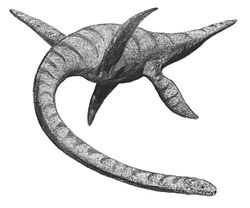Paleontology, palaeontology or palæontology (from Greek: paleo, "ancient"; ontos, "being"; and logos, "knowledge") is the study of prehistoric life forms on Earth through the examination of plant and animal fossils.[1] This includes the study of body fossils, tracks (ichnites), burrows, cast-off parts, fossilised feces (coprolites), palynomorphs and chemical residues. Because mankind has encountered fossils for millennia, paleontology has a long history both before and after becoming formalized as a science. This article records significant discoveries and events related to paleontology that occurred in the year 1824.
Dinosaurs
Newly named dinosaurs
Data courtesy of George Olshevsky's dinosaur genera list[3] and Dr. Jeremy Montague's dinosaur genus database.[4]
Plesiosaurs
New taxa
References
- ↑ Gini-Newman, Garfield; Graham, Elizabeth (2001). Echoes from the past: world history to the 16th century. Toronto: McGraw-Hill Ryerson Ltd. ISBN 9780070887398. OCLC 46769716.
- ↑ Farlow, James O.; M. K. Brett-Surmann (1999). The Complete Dinosaur. Bloomington, Indiana: Indiana University Press. p. 9. ISBN 0-253-21313-4.
- ↑ Olshevsky, George. "Dinogeorge's Dinosaur Genera List". Retrieved 2008-08-07.
- ↑ Montague, Jeremy. "Dr. Montague's Database". Retrieved 2008-10-29.
- ↑ Buckland, W. 1824. Notice on the Megalosaurus,
or great fossil lizard of Stonesfield. Transactions
of the Geological Society of London 2 (1): pp. 390-
396.
- ↑ Farlow, James O.; M. K. Brett-Surmann (1999). The Complete Dinosaur. Bloomington, Indiana: Indiana University Press. p. 8. ISBN 0-253-21313-4.

